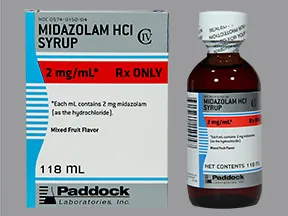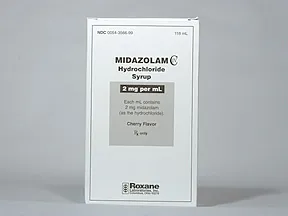Uses
This medication is used by children before a procedure or anesthesia to cause drowsiness, decrease anxiety, and cause forgetfulness of the surgery or procedure. It should be used while the child is under the care of a health professional. It is not for home or long-term use.Midazolam belongs to a class of medications called benzodiazepines, which produce a calming effect on the brain and nerves (central nervous system). It is thought to work by increasing the effect of a certain natural chemical (GABA) in the brain.
How to use Midazolam HCL
See also Warning section.
A healthcare professional will prepare and measure your dose. Take this medication by mouth as directed by your doctor. It is usually given as a single dose before a procedure or anesthesia.
The dosage is based on your medical condition, response to treatment, weight, and other medications you may be taking.
Though it helps many people, this medication may sometimes cause addiction. This risk may be higher if you have a substance use disorder (such as overuse of or addiction to drugs/alcohol). Do not increase your dose, take it more often, or use it for a longer time than prescribed. Talk with the doctor if this medication stops working well. Properly stop the medication when so directed.
Avoid eating grapefruit or drinking grapefruit juice while using this medication unless your doctor or pharmacist says you may do so safely. Grapefruit can increase the chance of side effects with this medicine. Ask your doctor or pharmacist for more details.
Side Effects
See also Warning section.
Nausea, vomiting, dizziness, or drowsiness may occur. If any of these effects last or get worse, notify the doctor or pharmacist promptly.
Remember that this medication has been prescribed because your doctor has judged that the benefit to you is greater than the risk of side effects. Many people using this medication do not have serious side effects.
Tell your doctor right away if you have any serious side effects, including: mental/mood changes (such as agitation, aggressive behavior), uncontrollable movements (such as shaking/tremor), slow/fast heartbeat, vision changes (such as blurred vision).
Get medical help right away if you have any very serious side effects, including: fainting, rapid/slow/shallow breathing.
A very serious allergic reaction to this drug is rare. However, get medical help right away if you notice any symptoms of a serious allergic reaction, including: rash, itching/swelling (especially of the face/tongue/throat), severe dizziness, trouble breathing.
This is not a complete list of possible side effects. If you notice other effects not listed above, contact the doctor or pharmacist.
In the US -
Call your doctor for medical advice about side effects. You may report side effects to FDA at 1-800-FDA-1088 or at www.fda.gov/medwatch.
In Canada - Call your doctor for medical advice about side effects. You may report side effects to Health Canada at 1-866-234-2345.
Warnings
Midazolam has a risk for abuse and addiction, which can lead to overdose and death. Taking this medication with alcohol or other drugs that can cause drowsiness or breathing problems (especially opioid medications such as codeine, hydrocodone) may cause very serious side effects, including death. To lower your risk, your doctor should have you take the smallest dose of midazolam that works, and take it for the shortest possible time. Be sure you know how to take midazolam and what other drugs you should avoid taking with it. See also Drug Interactions section. Get medical help right away if any of these very serious side effects occur: slow/shallow breathing, unusual lightheadedness, severe drowsiness/dizziness, difficulty waking up.
Suddenly stopping this medication may cause serious (possibly fatal) withdrawal, especially if you have used it for a long time or in high doses. To prevent withdrawal, your doctor may lower your dose slowly. Tell your doctor or pharmacist right away if you have any withdrawal symptoms such as headaches, trouble sleeping, restlessness, hallucinations/confusion, depression, nausea, or seizures. Withdrawal symptoms may sometimes last weeks to months.
Precautions
Before taking midazolam, tell the doctor or pharmacist if you are allergic to it; or to other benzodiazepines (such as diazepam); or if you have any other allergies. This product may contain inactive ingredients (such as cherry flavoring), which can cause allergic reactions or other problems. Talk to your pharmacist for more details.
Before using this medication, tell the doctor or pharmacist your medical history, especially of: kidney disease, liver disease, breathing problems (such as chronic obstructive pulmonary disease-COPD, sleep apnea), heart disease (such as heart failure), glaucoma, personal or family history of a substance use disorder (such as overuse of or addiction to drugs/alcohol).
This drug may make you dizzy or drowsy. Alcohol or marijuana (cannabis) can make you more dizzy or drowsy. Do not drive, use machinery, or do anything that needs alertness until you can do it safely. Avoid alcoholic beverages. Talk to your doctor if you are using marijuana (cannabis).
Before having surgery, tell your doctor or dentist about all the products you use (including prescription drugs, nonprescription drugs, and herbal products).
Infants and children younger than 3 years using anesthesia or drugs for sedation (including midazolam) for procedures/surgeries may be at risk for slower brain growth. Talk to the doctor about the risks and benefits of this medication.
Tell your doctor if you are pregnant or plan to become pregnant. You should not become pregnant while using midazolam. Midazolam may harm an unborn baby. Newborn babies of mothers who use this medication late in pregnancy may have symptoms such as slow/shallow breathing, nonstop crying, shaking, or trouble feeding. If you become pregnant, talk to your doctor right away about the risks and benefits of this medication.
This medication passes into breast milk. Consult your doctor before breastfeeding.
Interactions
See also Warning section.
Drug interactions may change how your medications work or increase your risk for serious side effects. This document does not contain all possible drug interactions. Keep a list of all the products you use (including prescription/nonprescription drugs and herbal products) and share it with your doctor and pharmacist. Do not start, stop, or change the dosage of any medicines without your doctor's approval.
Some products that may interact with this drug include: HIV protease inhibitors (such as saquinavir, atazanavir), lonafarnib, sodium oxybate, ritonavir.
Other medications can affect the removal of midazolam from your body, which may affect how midazolam works. Examples include azole antifungals (such as itraconazole, ketoconazole), macrolide antibiotics (such as erythromycin), cimetidine, rifamycins (such as rifabutin, rifampin), St. John's wort, certain anti-seizure medicines (such as carbamazepine, phenytoin), calcium channel blockers (such as diltiazem, verapamil), certain SSRIs (such as fluoxetine, fluvoxamine), nefazodone, conivaptan, among others.
The risk of serious side effects (such as slow/shallow breathing, severe drowsiness/dizziness) may be increased if this medication is taken with other products that may also cause drowsiness or breathing problems. Tell your doctor or pharmacist if you are taking other products such as opioid pain or cough relievers (such as codeine, hydrocodone), alcohol, marijuana (cannabis), drugs for sleep or anxiety (such as alprazolam, lorazepam, zolpidem), muscle relaxants (such as carisoprodol, cyclobenzaprine), or antihistamines (such as cetirizine, diphenhydramine).
Check the labels on all your medicines (such as allergy or cough-and-cold products) because they may contain ingredients that cause drowsiness. Ask your pharmacist about using those products safely.
Overdose
If someone has overdosed and has serious symptoms such as passing out or trouble breathing, call 911. Otherwise, call a poison control center right away. US residents can call 1-800-222-1222. Canada residents can call 1-844-764-7669. Symptoms of overdose may include: drowsiness, confusion, loss of coordination.
Do not share this medication with others. Sharing it is against the law.
This medication has been prescribed for your current procedure only. Do not use it later for another condition or procedure unless told to do so by the doctor. A different medication may be necessary in that case.
Lab and/or medical tests (such as breathing, blood pressure, heartbeat) should be done while you are taking this medication. Keep all medical and lab appointments. Consult your doctor for more details.
Not applicable.
Not applicable. This medication is given in a hospital, clinic, or doctor's office and will not be stored at home.
Images

midazolam 2 mg/mL oral syrup
Color: redShape: Imprint:This medicine is a red, clear, mixed fruit, syrup

midazolam 2 mg/mL oral syrup
Color: redShape: Imprint:This medicine is a red, clear, mixed fruit, syrup
Are you currently using Midazolam HCL?
This survey is being conducted by the WebMD marketing sciences department.
Selected from data included with permission and copyrighted by First Databank, Inc. This copyrighted material has been downloaded from a licensed data provider and is not for distribution, except as may be authorized by the applicable terms of use.
CONDITIONS OF USE: The information in this database is intended to supplement, not substitute for, the expertise and judgment of healthcare professionals. The information is not intended to cover all possible uses, directions, precautions, drug interactions or adverse effects, nor should it be construed to indicate that use of a particular drug is safe, appropriate or effective for you or anyone else. A healthcare professional should be consulted before taking any drug, changing any diet or commencing or discontinuing any course of treatment.